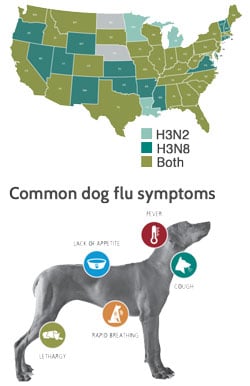The canine influenza virus H3N2 strain first showed up in Chicago in 2015 and didn't show immediate signs of spreading quickly. In late May, it reared its ugly head again, jumping across state lines and infecting an estimated 300 or more dogs. There are confirmed cases of H3N2 in Florida, Georgia, Kentucky, Louisiana, Missouri, North Carolina, South Carolina, Tennessee, and Texas, and there are several confirmed canine fatalities.
How did H3N2 begin spreading so fast? How can you protect your pup this summer?
The Recent Outbreak of Canine Influenza

Many experts agree that there's no way to exactly pinpoint where this new outbreak of H3N2 began, but dog shows seem to be a likely culprit of its continued growth. From Chicago to Perry, Ga. and Deland, Fla., dog shows seem at the epicenter of this rapid spread of the disease. It's not uncommon for breeders and owners to believe that dogs have a kennel cough when they first come down with canine influenza, meaning that they don't take swift steps to quarantine and treat the infected dog.
The dog show world has responded swiftly, however, as influenza has spread. Over 200 dogs reportedly pulled out of the Blue Ridge Classic Dog Show in North Carolina, and the Kennel Club of Texarkana 50th Anniversary dog show was canceled in June. Dog handlers across the U.S. are scrambling to get their canines vaccinated before attending any shows whatsoever.
It is worth noting that Canine Flu did NOT start at dog shows.
What Happens Next?
The H3N2 virus can be vaccinated for, but it has high mobility—meaning it is more contagious than other strains of the canine flu and spreads quickly. It can live on fomites (collars, bedding, and toys), making it easy to be transported, and around 20 percent of infected dogs never show symptoms. The good news? It has low mortality: only around 3-5 percent of infected dogs die, and they're usually either very young, very old, or have additional health issues.
Kennels, dog shows, and dog parks are areas that are ripe for canine flu outbreaks, and as dog show season and travel season ramp up, it's important to keep your pup safe.
Vaccination is Key for Dog Boarding
The rapid spread of H3N2 is a good example of why Intermountain Pet Hospital requires influenza vaccination for all dogs who board at the pet lodge. Pet boarding facilities are a common place to pass around diseases, and there's no reason to risk your dog's health and safety while you're away on vacation.
Vaccination is, without a doubt, the best way to curb the growing threat of canine influenza and eliminate needless fatalities. Dr. Cynda Crawford, DVM, Ph.D., University of Florida College of Veterinary Medicine clinical assistant professor says that vaccination is the primary tool; it doesn’t matter if you’re talking people, dogs, horse or pigs. Vaccination is the strategy."
When you leave your dog at our pet lodge, you can be sure that he or she will be safe from the canine influenza virus. Contact our lodge if you have any questions.
